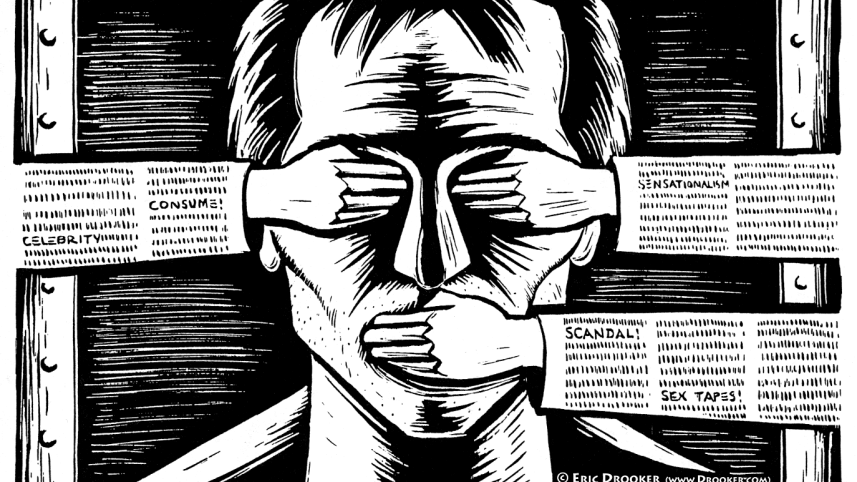A dark cloud on freedom of press

The editor of a local daily in Habiganj has become the latest victim to the draconian provision of the ICT Act.
He was sued by a ruling party man under the infamous section 57 of the law on charge of 'tarnishing image' of one of his party MPs. Police arrested him on Monday and produced him before a magistrate court in Habiganj. The magistrate thought it wise to deny him bail and sent him to jail.
But the nature of the allegation against Golam Mostofa Rafiq, editor of the Daily Habiganj Samachar, is curious. Thus it has raised the question whether the law has been applied judiciously by the police and the magistrate.
How did the daily tarnish the image of Habiganj-2 MP Abdul Majid Khan?
Citing a report of a Dhaka-based online newspaper that around 80 ruling Awami League MPs would not get the party's nomination in the next general elections, the Daily Habiganj Samachar published a report and mentioned the names of the lawmakers, including Abdul Majid, in the report.
Following the standard journalistic practice of localising news if that were possible, the newspaper focused on local MP Abdul Majid.
According to the online newspaper, the AL chief is conducting a survey to pick her party candidates in the next election. Allegations of various anomalies were raised against many MPs in the reports of different intelligence agencies, said the Habiganj Samachar report, adding that some other national dailies also ran similar reports recently.
However, the Daily Habiganj Samachar also included some information that underlined the good deeds of Abdul Majid for his constituency. The report said many locals think the MP has been working for the development of local people. His contribution to various development activities including construction of roads, school and college is undeniable. Through the development works Abdul Majid gained huge popularity. He is known as a leader of the mass, said the Habiganj Samachar report.
The additional paragraph of the Habiganj Samachar report seems to have questioned the inclusion of Majid's name in the list of 80 MPs who might not get AL nomination in the next election.
But this did not seem right to the ruling party man. On June 8, Afruz Mia, president of Pukra union unit Jubo League, lodged a case against Mostofa, also president of Habiganj press club and two others with Baniachang Police Station for allegedly running a false report on Abdul Majid. Others accused in the case are Rasel Chowdhury, acting editor of the Daily Habiganj Samachar, and Niharanjon Saha Niru, managing editor of the daily. However, they were not arrested by police.
According to section 57, if any person deliberately publishes any material in electronic form that causes to deteriorate law and order, prejudice the image of the State or person or causes to hurt religious belief, the offender will be punished for maximum 14 years.
Legal experts have unequivocally been saying that section 57 goes against people's right to freedom of expression and free speech. The section contains vague wordings, allowing its misuse against newsmen and social media users.
The significant rise of the number of cases under section 57 in recent years also testifies abuse of the law.
As of May this year, more than 8,000 cases were filed under section 57 in four years after the punishment had been toughened in 2013. The number of cases was only 317 in the first seven years since the Information and Communication Technology Act was made in 2006, according to police headquarters statistics.
The harsher punishment for defamation in the ICT law than the Penal Code has attracted litigants to use this provision to silence the opposition, particularly journalists and writers.
Under the Penal Code of 1860, one may be punished with simple imprisonment for a term which may extend to two years, or with fine, or with both for defamation. But one may be punished up to 14 years to imprisonment for defaming anybody under the ICT Act.
Moreover, the government in 2011 limited the court's powers to directly issue arrest warrant against journalists, writers and others for writing or saying anything defamatory. An amendment to the Criminal Procedure Code (CrPC) introduced a provision for issuing summons against them.
Some journalists were arrested in the past by the police after the case was filed under ICT Act. They were released later on bails.
But the case of Habiganj daily editor sets a bad instance. This may have a chilling effect on the media even in the innocuous act of publishing the result of a survey related to elections, even though the survey was done by the party itself.
It is because a newspaper editor may be sued under the draconian provision of ICT Act if the result goes against a party or politician. This instance is a dark cloud on freedom of the press until the arbitrary use of the law is stopped.
When the necessity of a law like Section 57 in modern democratic society is being debated, the least people can expect is the application of judicial mind and prudence in enforcement of this law.




 For all latest news, follow The Daily Star's Google News channel.
For all latest news, follow The Daily Star's Google News channel.
Comments